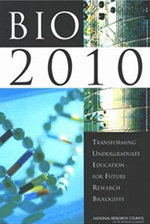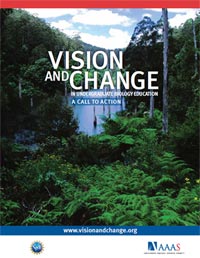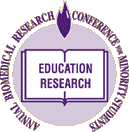 Last month, I attended the “Beyond Bio2010” conference held at the National Academy of Sciences. The meeting highlighted the progress made in implementing the Bio2010
Last month, I attended the “Beyond Bio2010” conference held at the National Academy of Sciences. The meeting highlighted the progress made in implementing the Bio2010  recommendations, chiefly to transform undergraduate biology education by using the quantitative sciences (mathematics, chemistry, physics, engineering and computer sciences) to study biology and vice versa.
recommendations, chiefly to transform undergraduate biology education by using the quantitative sciences (mathematics, chemistry, physics, engineering and computer sciences) to study biology and vice versa.
The 2-day meeting, which was held in the same room that the Bio2010 report was publically released in 2002, primarily consisted of teams of biology, math and computer sciences faculty discussing strategies used by their institutions to reform science curricula. Among the efforts that really caught my attention were those that:
- Assessed student learning outcomes and showed improvement as a result of integrating math, physics, chemistry and computer science into biology;
- Established new interdisciplinary majors or minors in areas like bioinformatics;
- Described efforts to break down “departmental silos” through collaborations among biology, math, chemistry and other faculty;
- Trained faculty for an integrated pedagogical approach (for a resource, see The National Academies Summer Institutes on Undergraduate Education in Biology); and
- Discussed the need for the administration to formally recognize faculty who reformed the curricula.
In addition, I presented a summary of NIGMS-supported efforts, namely the MARC Curricular Improvement grant, a competitive mechanism for eligible institutions to implement Bio2010 recommendations. The inclusion of all undergraduate students, with a focus on historically unrepresented populations, was a significant theme of the conference. In fact, I was delighted to see one of our MARC Curricular Improvement grantees from the University of Puerto Rico talk about her institution’s efforts on this front.
A unique feature of the conference was that several undergraduate students also presented posters on their interdisciplinary biology and mathematics research. Their posters showed math majors collecting samples in a stream and biology majors performing mathematical modeling. A faculty attendee at the conference noted that when he walked around and listened to the student presenters, he really could not figure out who was a math major and who was a biology major—a desired outcome of Bio2010!
If you are interested in finding more details about “Beyond Bio2010,” a report of the conference is slated to be published in the Fall 2010 issue of CBE—Life Sciences Education  .
.


 A national effort called
A national effort called  is under way to transform undergraduate biology education at the departmental level.
is under way to transform undergraduate biology education at the departmental level.

 Last month, I attended the “Beyond Bio2010” conference held at the National Academy of Sciences. The meeting highlighted the progress made in implementing the
Last month, I attended the “Beyond Bio2010” conference held at the National Academy of Sciences. The meeting highlighted the progress made in implementing the